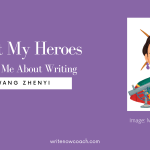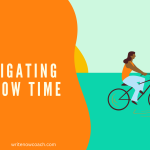Wednesday Writing Prompt: Writing Your Dreams
 Your dreams can be a rich source of stories, images, metaphors, and sensory details for your writing. Jacquelyn Mitchard’s novel The Deep End of the Ocean and Stephenie Meyer’s Twilight both began with the authors’ dreams. You, too, can use your dreams to spark a new story or give an existing story new life.
Your dreams can be a rich source of stories, images, metaphors, and sensory details for your writing. Jacquelyn Mitchard’s novel The Deep End of the Ocean and Stephenie Meyer’s Twilight both began with the authors’ dreams. You, too, can use your dreams to spark a new story or give an existing story new life.
Dream Journal. Start by keeping a dream journal next to your bed. You can use your regular journal for this, but I find it helpful to keep all of my dreams in one book. When you wake up from a vivid dream, before you stretch or get up to use the restroom, grab the journal and write down everything you can remember from the dream. Try not to move major muscle groups before you do this: once you move your body in this world, you will begin to lose your dream world. (I know this sounds a little woo-woo—but it is true!) Do not count on remembering the dream in the morning or later in the day. You may not. Write down the major parts of the dream while it is clear in your mind.
Dream Weaving. Later the same day, when you have a bit of time, read over the dream. Write it out again, filling in details you might have missed. Once you are satisfied with what you have written, you can do one of the following writing exercises.
*Rewrite the dream, paying attention to recording sensory details. What sights, sounds, and smells do you recall? If you don’t recall any, what would you imagine might be there?
*Are there characters in the dream you are especially drawn to? Describe them. What did they look like? What do they value? What do they want?
*Underline bits of the dream that you think might make good scenes, metaphors, or images for a story or song you are working on. Write about how each might work. You might use sentence starters like, “What if …” For example, “what if my main character dreamt about fighting a dragon?” or “What if my main character fought a dragon?”
*Consider what might have happened in the dream before you started dreaming and after you woke up. If your dream was the middle of the story, how does the story begin and end?
*Revisit your dream journal for inspiration and ideas.
Resources Most of the resources I have used over the years have to do with interpreting dreams for personal growth. Dreams can be a powerful tool for thinking about our lives, what we need to let go of, and what we need to move toward. Here are a few of the resources I have found most helpful.
The Beginner’s Guide to Dream Interpretation by Clarissa Pinkola Estes (audio book) Rich with imagery from mythology, Estes guides listeners through interpreting their dreams.
The Dream Book: Symbols for Self Understanding by Betty Bethards Bethards offers both a method for exploring the meaning behind dreams and a dream dictionary.
Dream Moods (TM) An Online Guide to Dream Interpretation This is a fun online dictionary to help interpret dreams. You can find out the most common meaning of popular symbols in your dream. But remember to trust your own gut on what each symbol means.
Your turn. How do you work with your dreams? Do you have favorite resources to help you use your dreams in your writing? I look forward to reading your comments!














